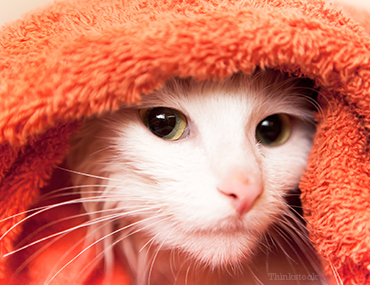
Have you ever seen a cat on the beach or swimming in a pool? Most people, myself included, would probably say no. So have you ever wondered if there is any truth to the commonly held belief that cats hate water?
Wild cats and water
A good way to start the conversation is by looking at our domestic cats’ wild relatives. After all, many of our pets’ behaviors are remnants of their wild ancestors’ instincts. Regarding water, wild cats fall into two camps—generally depending on where they live.
- Cats from warmer climates, such as lions, tigers, leopards, jaguars and ocelots, like water to cool off and are generally good swimmers.
- Cats from colder climates, like bobcats, lynx and snow leopards, avoid water because getting wet would hamper their coats’ ability to keep them warm.
Domestic cats and water
Domestic cats, though related to these wild cats, are not directly descended from them. Domestic cats have developed over many centuries from a single wild ancestor that still exists in the wild today, the Near Eastern wildcat of the Middle East. As water is scarce in the Middle East, these cats were not exposed to it in any great degree, and their decedents, likewise, do not generally appreciate water except for drinking.
Domestic cats that don’t like water
Today, most domestic cats would rather not bathe in, swim in or otherwise interact with water. Fortunately, they do not need to. While other species of animals (such as humans) clean themselves with water, it is not necessary for cats to do so. Cats are inherently clean animals; they use their tongues, which have minute hooked shaped papillae, to assist in grooming out knots and keeping the coat clean, sweet smelling and in tip-top shape. In addition, many breeds have coats that trap water, so getting wet makes it hard for them to stay warm in cool weather.
Domestic cats that do like water
Of course, there are exceptions to the general rule:
- The Turkish Van, a breed of cat known as the “swimming cat,” loves water. So does the Turkish Angora that hails from the same area. It is possible that these cats enjoy water because of where they evolved, that is, they swam in Lake Van to cool down.
- Bengal cats are also well known to love water; this makes sense when you consider that the Bengal is the offspring of domestic cats crossed with the Asian Leopard Cat—a wild cat known to swim.
- Likewise, Savannah cats—developed by crossing domestic cats with wild servals—retain the wild cats’ love of water.
- Norwegian Forest Cats have been known to snag fish from lakes and streams in their native habitat.
- Maine Coon Cats, with their dense and water-repellent coats, were a mainstay of New England whalers.
- Abyssinians were ship cats, making the journey from their Indian Ocean coastal homeland to Europe by boat in the 19th century.
- Interestingly, three cats with short or absent tails also like water: The American Bobtail, the Japanese Bobtail and the Manx. While the Manx (from the Isle of Man) and the Japanese Bobtail were developed on islands, perhaps accounting for their affinity with water, the American Bobtail may have just developed its affinity in conjunction with the natural mutation that brought about the short tail.
Many cats will play with water
Many other domestic cats will play with water, such as water left in a shower stall or dripping water in a sink—even with the water in their drinking bowl. Some will even sit on the edge of your bath and play with the bubbles, rubber duckies, or wet children (like Starlite, my own domestic shorthair cat). The key to getting a cat to like water is to introduce them to water when they are young and avoid using water as a punishment (that means no squirting them with water).
So what is the truth about cats and water?
Cats are very individualistic. While most domestic cats naturally show indifference or even an aversion to water, there are exceptions and you will find individuals that actually like water. Conversely, there are individuals from breeds known to have an affinity to water, that go against the norm and dislike it.
So does your cat love or loathe water? Tell us below!
Also check out the surfing cat from Peru.
If you have any questions or concerns, you should always visit or call your veterinarian -- they are your best resource to ensure the health and well-being of your pets.
